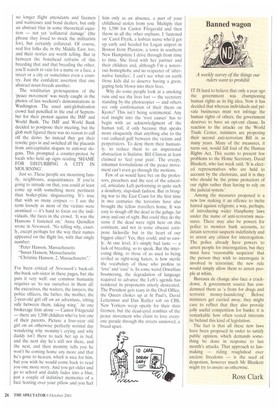Banned wagon
A weekly survey of the things our rulers want to prohibit
IT IS hard to believe that only a year ago the government was championing human rights as its big idea. Now it has decided that whereas individuals and private businesses must not infringe the human rights of others, the government deserves to have an opt-out clause. In reaction to the attacks on the World Trade Center, ministers are proposing their second anti-terrorism Bill in as many years. Many of the measures, it turns out, would fall foul of the Human Rights Act. This seems to present few problems to the Home Secretary, David Blunkett, who last week said, 'It is elected representatives who are held to account by the electorate, and it is they who should be the prime protectors of our rights rather than having to rely on the judicial system.'
Among the measures proposed is a new law making it an offence to incite hatred against religions; a way, perhaps, of introducing wider blasphemy laws under the name of anti-terrorism measures. There may also be powers for police to monitor bank accounts, to detain terrorist suspects indefinitely and to arrest any citizen for interrogation. The police already have powers to arrest people for interrogation, but they must have 'reasonable suspicion' that the person they wish to interrogate is involved in terrorism; the new rule would simply allow them to arrest people at whim.
Bureaux de change also face a crackdown. A government source has condemned them as 'a front for drugs and terrorist money-laundering'. Before ministers get carried away, they might care to reflect that they also provide jolly useful competition for banks; it is remarkable how often vested interests lie behind this kind of legislation.
The fact is that all these new laws have been proposed in order to satisfy public opinion, which demands something be done in response to last month's attacks. That approach to lawmaking — riding roughshod over ancient freedoms — is the seed of despotism, however much Mr Blunkett might try to assure us otherwise.
Ross Clark


































































































 Previous page
Previous page